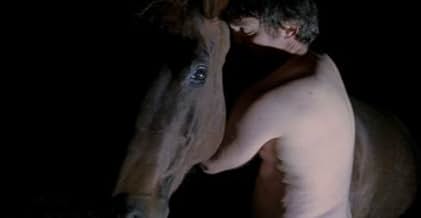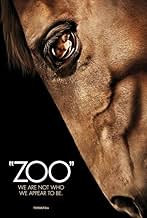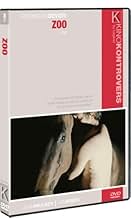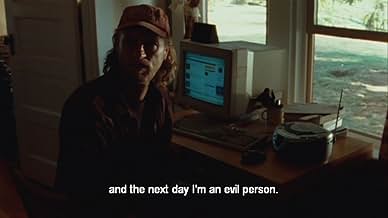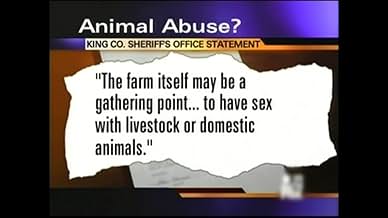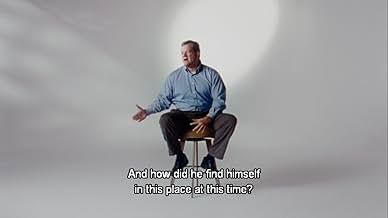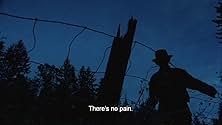PUNTUACIÓN EN IMDb
5,5/10
3 mil
TU PUNTUACIÓN
Añade un argumento en tu idiomaA look at the life of an Enumclaw, Washington man who died as a result of an unusual encounter with a horse.A look at the life of an Enumclaw, Washington man who died as a result of an unusual encounter with a horse.A look at the life of an Enumclaw, Washington man who died as a result of an unusual encounter with a horse.
- Premios
- 1 premio y 4 nominaciones en total
Forest Fousel
- Capitol Hill Man
- (as Forest L. Fousel)
Andrew Scott McIntyre
- Military Man
- (as Andrew McIntyre)
Michael J. Minard
- Cop #1
- (as Michael Minard)
Argumento
¿Sabías que...?
- CuriosidadesThe horse performer in this movie was a Thoroughbred mare named 'Somebodys Baby', and is a former successful racehorse. The horse in the incident portrayed was in reality an Arabian stallion.
- ConexionesFeatured in Aristokraticheskiy kinematograf: Episodio #1.9 (2011)
Reseña destacada
Zoo is not a docudrama about caging animals but about having sex with them. The film, directed by Robinson Devor, comes out of an incident in 2005 in Enumclaw Washington, a rural community 45 miles southeast of Seattle in which a Boeing engineer died as a result of a perforated colon after having anal intercourse with an Arabian stallion. Known only as Mr. Hands in the film, the deceased man was a divorced father of a young son with a top level job who used his weekends as an escape from a suffocating life style. Since Washington law at the time allowed sex with animals, no one was charged with a crime.
While few object to depriving animals of their freedom in zoos or sending them to slaughterhouses to be ground up for hamburgers, the thought of men having sex with animals stirs up reservoirs of righteous indignation and the incident became fodder for the media and Internet message boards which approached it with typical scorn and ridicule. Devor uses a combination of audio interviews with actual participants and reenactments from actor stand-ins to attempt to shed some light on what actually happened. The film delivers neither judgment of the practice nor evaluation of the psychology behind it but simply raises the question whether zoophilia is simply another form of sexual orientation or whether it constitutes abuse of a being incapable of giving consent.
Shot in muted colors, Zoo has a lyrical and poetic style with a moving sound track that gives the film an air of something forbidden but also something eerily beautiful. Bringing a taboo subject out of the darkness and subjecting it to some light, the film allows us to reexamine our preconceived notions about a practice that has in fact been going on since Ancient Greece. Opening with an interview with Coyote, a coal miner from Virginia who came to Washington to meet like minded friends, the film examines the phenomenon of the "zoophile" community, a group of isolated individuals where such appetites are shared. The men gather at all night parties, talk about their love for animals, and engage in an activity they consider natural but which the rest of the world frowns upon. After he was identified as a participant, one man asks how he could be a good man yesterday and a bad man today but the question remains unanswered.
We hear the voices of some of the members of the group but only Jenny Edwards of the organization "Hope for Horses" speaks directly to the camera. While the thrust of her remarks are humane, her participation in a dramatization of the gelding of the horse involved is disturbing and is certainly done without the horses consent. Zoo neither endorses sex with animals nor condemns it but simply empathizes with the humanity of the participants who, for one reason or another, prefer anonymous sex as Richard Gere put it in Pretty Woman, "without all the emotional hassles" of relationships. By doing so, the issue is removed from the level of abstraction and the death is made heartbreakingly real.
While few object to depriving animals of their freedom in zoos or sending them to slaughterhouses to be ground up for hamburgers, the thought of men having sex with animals stirs up reservoirs of righteous indignation and the incident became fodder for the media and Internet message boards which approached it with typical scorn and ridicule. Devor uses a combination of audio interviews with actual participants and reenactments from actor stand-ins to attempt to shed some light on what actually happened. The film delivers neither judgment of the practice nor evaluation of the psychology behind it but simply raises the question whether zoophilia is simply another form of sexual orientation or whether it constitutes abuse of a being incapable of giving consent.
Shot in muted colors, Zoo has a lyrical and poetic style with a moving sound track that gives the film an air of something forbidden but also something eerily beautiful. Bringing a taboo subject out of the darkness and subjecting it to some light, the film allows us to reexamine our preconceived notions about a practice that has in fact been going on since Ancient Greece. Opening with an interview with Coyote, a coal miner from Virginia who came to Washington to meet like minded friends, the film examines the phenomenon of the "zoophile" community, a group of isolated individuals where such appetites are shared. The men gather at all night parties, talk about their love for animals, and engage in an activity they consider natural but which the rest of the world frowns upon. After he was identified as a participant, one man asks how he could be a good man yesterday and a bad man today but the question remains unanswered.
We hear the voices of some of the members of the group but only Jenny Edwards of the organization "Hope for Horses" speaks directly to the camera. While the thrust of her remarks are humane, her participation in a dramatization of the gelding of the horse involved is disturbing and is certainly done without the horses consent. Zoo neither endorses sex with animals nor condemns it but simply empathizes with the humanity of the participants who, for one reason or another, prefer anonymous sex as Richard Gere put it in Pretty Woman, "without all the emotional hassles" of relationships. By doing so, the issue is removed from the level of abstraction and the death is made heartbreakingly real.
- howard.schumann
- 3 nov 2007
- Enlace permanente
Selecciones populares
Inicia sesión para calificar y añadir a tu lista para recibir recomendaciones personalizadas
- How long is Zoo?Con tecnología de Alexa
Detalles
Taquilla
- Recaudación en Estados Unidos y Canadá
- 69.770 US$
- Fin de semana de estreno en EE. UU. y Canadá
- 7811 US$
- 29 abr 2007
- Recaudación en todo el mundo
- 69.770 US$
- Duración1 hora 15 minutos
- Color
- Relación de aspecto
- 1.78 : 1
Contribuir a esta página
Sugerir un cambio o añadir el contenido que falta



